Daniel James Brown - The Indifferent Stars Above: The Harrowing Saga of the Donner Party
Here you can read online Daniel James Brown - The Indifferent Stars Above: The Harrowing Saga of the Donner Party full text of the book (entire story) in english for free. Download pdf and epub, get meaning, cover and reviews about this ebook. year: 2009, publisher: William Morrow, genre: History / Science. Description of the work, (preface) as well as reviews are available. Best literature library LitArk.com created for fans of good reading and offers a wide selection of genres:
Romance novel
Science fiction
Adventure
Detective
Science
History
Home and family
Prose
Art
Politics
Computer
Non-fiction
Religion
Business
Children
Humor
Choose a favorite category and find really read worthwhile books. Enjoy immersion in the world of imagination, feel the emotions of the characters or learn something new for yourself, make an fascinating discovery.
- Book:The Indifferent Stars Above: The Harrowing Saga of the Donner Party
- Author:
- Publisher:William Morrow
- Genre:
- Year:2009
- Rating:4 / 5
- Favourites:Add to favourites
- Your mark:
- 80
- 1
- 2
- 3
- 4
- 5
The Indifferent Stars Above: The Harrowing Saga of the Donner Party: summary, description and annotation
We offer to read an annotation, description, summary or preface (depends on what the author of the book "The Indifferent Stars Above: The Harrowing Saga of the Donner Party" wrote himself). If you haven't found the necessary information about the book — write in the comments, we will try to find it.
The Indifferent Stars Above: The Harrowing Saga of the Donner Party — read online for free the complete book (whole text) full work
Below is the text of the book, divided by pages. System saving the place of the last page read, allows you to conveniently read the book "The Indifferent Stars Above: The Harrowing Saga of the Donner Party" online for free, without having to search again every time where you left off. Put a bookmark, and you can go to the page where you finished reading at any time.
Font size:
Interval:
Bookmark:
The Harrowing Saga of the DONNER PARTY

For Sharon
Thank you
And they had nailed the boards above her face,
The peasants of that land,
Wondering to lay her in that solitude,
And raised above her mound
A cross they had made out of two bits of wood,
And planted cypress round;
And left her to the indifferent stars above.
W. B. Y EATS ,
A Dream of Death
E ven well after the tragedy was over, Sarah Gravess little sister Nancy often burst into tears for no apparent reason. She mystified many of her schoolmates in the new American settlement at the Pueblo de San Jos;. One minute she would be fine, running, laughing, and playing on the dusty school ground like any other ten-or eleven-year-old, but then suddenly the next minute she would be sobbing. All of them knew that she had been part of what was then called the lamentable Donner Party while coming overland to California in 1846. Recent emigrants themselves, most of them knew, generally, what that meant and sympathized with her for it. But for a long while, none of them knew Nancys particular, individual secret. That part was just too terrible to tell.
Nancy Gravess secret was just one part of many things that were too terrible to tell by the time the last survivors of the Donner Party staggered out of the Sierra Nevada Mountains in the spring of 1847. And for decades thereafter, many of those things were not told, except in tabloid newspaper accounts that were often compounded far more of fiction than of truth. It wasnt until a newspaper editor named Charles F. McGlashan began to delve into the story in the 1870s that many of the real details of what had happened that winter in the Sierra Nevada started to emerge. McGlashan set about interviewing survivors, and in 1879 he published his History of the Donner Party, the first serious attempt at documenting the disaster. Since then the true stories and the fictional ones have bred and interbred in the American imagination.
In introducing his recent book, Patriot Battles: How the War of Independence Was Fought, Michael Stephenson points out that our ideas about the generation that fought the American Revolution have become embalmed by the slow accretion of national mythology. How true. I still cannot think of George Washington without visualizing him as a marble bust. But if the generation of 1776 has been fossilized by mythology, the same is equally true of their grandchildren. The emigrant generation of the 1840s has been endlessly depicted in film and television productions, almost always in highly stereotyped waysa string of clichs about strong-jawed men circling the wagons to hold off Indian attacks and hard-edged women endlessly churning butter and peering out from under sunbonnets with eyes as cold and hard as river-worn stones.
The emigrants of the 1840s deserve better. They were, on the whole, a remarkable people living in remarkable times. Just how remarkable they were has largely been camouflaged for us, not only by the stereotyping and the mythologizing but by the homespun ordinariness of their clothes, the commonplace nature of their language, the simple virtues they held dear, and the casual courage with which they confronted long odds and bitterly harsh realities. The men among them did, in fact, sometimes circle their wagons to defend against potential Indian attacks, though the attacks were anticipated far more often than they ever occurred. But the men also lay awake at night agonizing about what they had gotten their families into, schemed to take advantage of one another, sobbed under the stars when their children died, lusted after women half their ages. And the women did, of course, churn a great deal of butter, but they also studied botany, counseled troubled teenagers, yearned for love, struggled with domineering husbands, and made wild rollicking love deep in the recesses of their covered wagons. Like all people in all times, the emigrant men and women, as well as the Native American men and women, of the 1840s were complex bundles of fear and hope, greed and generosity, nobility and savagery.
And in the end, each of them was, of course, an individual, as unique and vital and finely nuanced as you or me. So before I began to write this book, I made a vow to myself that wherever possible I would cut through the clichs and resist the easy assumptions about the men and women who went west in 1846. And I decided that I would focus on one woman in particular, Sarah Graves, and tell the unvarnished truth about what happened to her in the high Sierra in the terrible winter of that year.
Sarah hasnt made it easy. She left little record of her own experiences, and while others who suffered through the ordeal with her that winter have left us with their own, sometimes quite detailed accounts, few of them have had much to say about her. But what accounts there are suggest that she was a friendly, sociable, and thoughtful person, well liked by many of her companions but perhaps not apt to call attention to herself. And so while I have everywhere tried to remain entirely factual in writing about her, I have at times extrapolated from what those who accompanied her reported or from the published findings of experts in particular fields to describe what she must have experienced. Knowing, for instance, that she spent a specific night sleeping on the snow, clad only in wet flannel as the mercury plummeted into the low twenties, allows us also to know with reasonable certainty what she must have experienced in terms of physical discomfort, potential hypothermia, and psychological distress. So I have gone where eyewitness accounts and expert testimony have led me in describing such experiences. Similarly, in places I have drawn on my own experiences walking in her footsteps to re-create direct physical sensations that she must inevitably have felt. So, for example, in describing her passage through tall prairie grass, I have included sensory details from my own trek through the deep grass of the Willa Cather Memorial Prairie in Nebraska.
With that in mind, I offer this book not as a comprehensive history-of the Donner Party but as a lens through which I hope you will be able to gaze with compassion and understanding on one young woman and all that the world once was to her.
D ANIEL J AMES B ROWN
Redmond, Washington
September 1, 2008
I n many ways this book began one hot October afternoon in the fall of 2006 when I drove up the Napa Valley searching for bones. I have an affinity for bones. I like their hard-and-fast durability, the crispness of their lines, the heft and weight of them. Most of all I like their honesty. Bones have their secrets, but they tell no lies.
I made my way slowly up the valley in a rental car, trapped in the usual weekend procession of tourists promenading from one winery to the next on Highway 29. Heat waves rippled off of the black asphalt ahead of me. A vague autumnal haze hung over the valley, and so did the heady aroma of fermenting wine. The harvest was in full swing. Crews of pickers were making their way among the vines, stooped over, lugging white plastic boxes full of dark grapes. Watching them, I was glad for the cars air conditioner.
The wine tourists and I crept through the hot but picturesque old brick downtown of St. Helena, past the stately stone buildings of the Beringer winery, then past the Old Bale Mill. I craned my neck to see the mill, but its enormous wooden waterwheel was hidden behind a screen of redwoods. I remember the mill fondly as a shady, cool place my father used to bring me for picnics on warm days like this when I accompanied him on sales trips up the valley in the 1960s. Finally, just south of Calistoga, I pulled out of the parade and parked my car in front of a stately old farmhouse. The house is the headquarters for the Bothe-Napa Valley State Park now, but once it belonged to my great-uncle, George Washington Tucker.
Font size:
Interval:
Bookmark:
Similar books «The Indifferent Stars Above: The Harrowing Saga of the Donner Party»
Look at similar books to The Indifferent Stars Above: The Harrowing Saga of the Donner Party. We have selected literature similar in name and meaning in the hope of providing readers with more options to find new, interesting, not yet read works.
Discussion, reviews of the book The Indifferent Stars Above: The Harrowing Saga of the Donner Party and just readers' own opinions. Leave your comments, write what you think about the work, its meaning or the main characters. Specify what exactly you liked and what you didn't like, and why you think so.

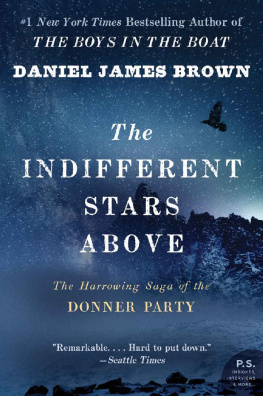
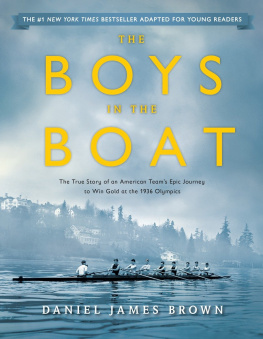

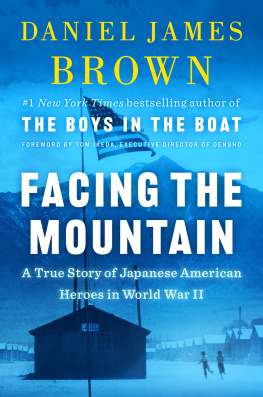

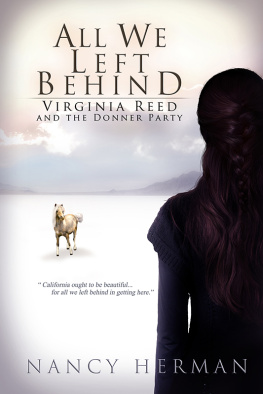
![Blackstone Audio Inc. - Ordeal by hunger: [the story of the Donner Party]](/uploads/posts/book/167807/thumbs/blackstone-audio-inc-ordeal-by-hunger-the.jpg)



